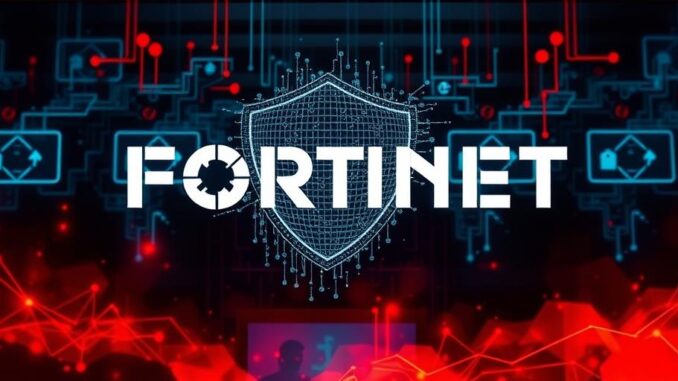
Summary
A 2024 data breach at Fortinet exposed limited customer data from a third-party cloud storage platform. The cybersecurity company confirmed the breach, stating less than 0.3% of its customers were affected. While Fortinet maintains its operations remained unaffected, the incident highlights vulnerabilities even within leading security firms.
** Main Story**
Fortinet Data Breach: A Cybersecurity Giant Compromised
In September 2024, Fortinet, a leading cybersecurity firm, publicly acknowledged a data breach affecting a small percentage of its customer base. The breach involved unauthorized access to a third-party cloud-based file storage system utilized by Fortinet. The compromised data reportedly included customer information, though the specific details remain undisclosed.
Fortinet’s Response and Disclosure
Following the discovery of the breach, Fortinet acted swiftly to contain the incident and launched a thorough investigation. The company assured its customers that its core operations, products, and services remained unaffected. Fortinet also stated that it directly communicated with the affected customers to inform them of the situation and offer support.
The Hacker’s Claims and Ransom Demands
Shortly after Fortinet’s announcement, an individual claiming responsibility for the breach emerged on a hacker forum. This individual, using the alias “Fortibitch,” alleged to have exfiltrated 440 GB of data from Fortinet’s Azure SharePoint and subsequently released the stolen data after Fortinet refused to pay a ransom. The hacker’s claims included accusations that Fortinet’s founder, Ken Xie, rejected ransom negotiations and that the company failed to file the mandatory SEC 8-K form following the incident.
Impact and Implications of the Breach
While Fortinet minimized the impact of the breach, emphasizing that less than 0.3% of its customer base was affected, the incident raises concerns about the vulnerability of even cybersecurity giants to data breaches. The fact that a leading security firm fell victim to such an attack underscores the evolving threat landscape and the need for constant vigilance. This breach serves as a reminder for all organizations, regardless of size or industry, to prioritize cybersecurity and implement robust security measures.
Ransomware’s Rising Threat to Healthcare
Beyond the Fortinet breach, the healthcare sector faces an increasing threat from ransomware attacks. These attacks can disrupt critical operations, delay essential treatments, and potentially lead to fatalities. Hospitals are particularly vulnerable due to their reliance on digital systems and the sensitive nature of patient data. The increasing frequency and severity of these attacks underscore the need for enhanced cybersecurity measures and resilient infrastructure within healthcare institutions.
Protecting Healthcare from Cyberattacks
Several measures can help hospitals and medical establishments mitigate the risks posed by ransomware attacks:
-
Regular Security Assessments: Conducting thorough and routine security assessments can identify vulnerabilities and weaknesses in systems.
-
Employee Training: Educating employees about cybersecurity best practices, including recognizing and avoiding phishing attacks, is crucial.
-
Data Backups: Implementing robust data backup and recovery procedures can ensure business continuity in the event of a ransomware attack.
-
Incident Response Plan: Developing a comprehensive incident response plan can help organizations respond effectively to cyberattacks and minimize their impact.
-
Collaboration and Information Sharing: Sharing information about cyber threats and best practices among healthcare organizations can enhance collective defense.
The growing threat of ransomware attacks, as evidenced by the Fortinet data breach and numerous attacks on hospitals, demands immediate attention. By adopting proactive security measures and fostering a culture of cybersecurity awareness, healthcare institutions can better protect themselves and their patients from these devastating attacks.


“Fortibitch,” eh? Sounds like someone skipped cybersecurity 101. I wonder if Fortinet’s training modules now include “Negotiating with colourful hacker nicknames”? Asking for a friend… who’s considering a career change.
That’s a great point! Maybe ‘Negotiating with colourful hacker nicknames’ should be a module. It highlights the importance of understanding the psychology and tactics used by cybercriminals, which is definitely evolving. Could be a valuable addition to any cybersecurity curriculum!
Editor: MedTechNews.Uk
Thank you to our Sponsor Esdebe
The Fortinet breach highlights the crucial role of third-party vendor risk management. Even leading security firms can be vulnerable through their supply chain. Organizations should rigorously assess the security posture of all third-party vendors, especially those handling sensitive data.
That’s a really important point about third-party vendor risk management. It’s a shared responsibility, and this incident emphasizes the need for not just assessments, but also continuous monitoring and clear contractual obligations regarding security. Thanks for highlighting this critical aspect!
Editor: MedTechNews.Uk
Thank you to our Sponsor Esdebe